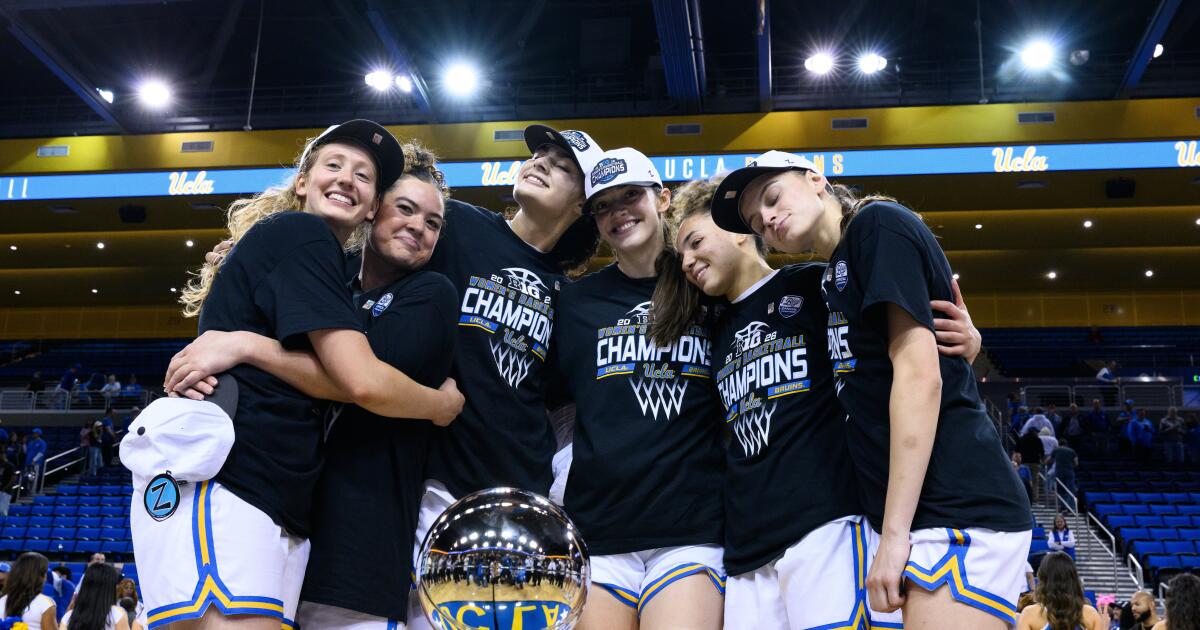UCLA’s super selfless seniors are key to women’s basketball success
The UCLA women’s basketball team is closing in on an undefeated Big Ten season, clinched the outright regular season league title for the first time in school history, is riding a 21-win streak and is ranked No. 2 nationally.
Perhaps most remarkable, the Bruins firmly believe they can be better and have yet to peak as they push to win a national title.
How did UCLA go from being a team that got pushed around by UConn, LSU and South Carolina in the NCAA tournament the last three seasons to a loaded squad no one wants to face in March?
Bruins coach Cori Close solved the riddle by recruiting six senior leaders who accepted they had to continuously sacrifice and push to improve to achieve their goals. They echo their coach’s values, putting each other first in order to succeed.
“Me and Kiki [Rice] came here in our freshman year and it’s just been amazing to see the program grow since then,” UCLA senior Gabriela Jaquez said. “And I think that’s also a big credit to our coaches and to all the staff at UCLA to really get the fans out there and support us because we really couldn’t do it without them.”
UCLA honored Lauren Betts, Angela Dugalić, Jaquez, Gianna Kneepkens, Charlisse Leger-Walker and Rice during their final regular-season home game Sunday. The group will be back soon to host first- and second-round NCAA tournament games at Pauley Pavilion, but Close wanted them to take the time to celebrate all they had accomplished together.
Betts is in the national player of the year conversation, but the big award is likely to go to another player who carries a heavier workload for their team. Close said the seniors are all projected to be WNBA draft picks, but they have sacrificed better individual statistics and potentially some awards in exchange for a better shot at winning a national championship. She said the selfless approach is rare and should be cherished.
“One of them said the other day, like, ‘I might not ever play on a team like this again,’” Close said of her senior class. “I think the combination of the depth of the relationship, excellence on the court, their love of the work — they love to work and get better together — and their connection off the court.
”… I think these seniors actually do really understand that this is really special. They’ve set a bar for the culture of our program that we will be forever measuring it against.”
Baseball makes a statement
No. 1 UCLA baseball team turned heads with a weekend sweep of No. 7 TCU. The Bruins beat the Horned Frogs 10-2 on Friday, 5-1 on Saturday and 15-5 on Sunday. Roch Cholowsky and Will Gasparino have racked up six home runs apiece during UCLA’s first seven games this season.
Softball keeps rolling
The No. 9 UCLA softball team beat No. 11 Texas A&M 15-7 in five innings on Sunday to cap a 6-0 weekend at the Mary Nutter Collegiate Classic. The Bruins also beat No. 20 Duke and No. 13 South Carolina. Senior Megan Grant delivered a .545 batting average during the weekend with two home runs and nine walks.
Gymnastics knocks out Illini
No. 5 UCLA gymnastics defeated Illinois 197.675-195.475 Sunday in Champaign, Ill.
Jordan Chiles won the all-around (39.650), vault (9.950) and floor exercise (9.975), while Ciena Alipio won balance beam (9.950).
The Bruins host three top 25 programs — Iowa, Ohio State and Maryland — during the Big Fours meet Friday at Pauley Pavilion.
In case you missed it
UCLA women blitz Wisconsin on Senior Day, win 21st in a row
Donovan Dent channels Tyus Edney, lifts UCLA to stunning OT win over No. 10 Illinois
UCLA to play 2026 football season at Rose Bowl as lawsuit continues
UCLA’s Mick Cronin apologizes for ejecting player, says he’s still ‘a good fit’ as coach
No. 2 UCLA’s 20th win in a row clinches share of first conference crown in 27 years
Plaschke: UCLA must eject Mick Cronin if he can’t respect his players
UCLA men are no match for Michigan State
No. 2 UCLA wins its 19th straight game with thrashing of Indiana
Have something Bruin?
Do you have a comment or something you’d like to see in a future UCLA newsletter? Email newsletters editor Houston Mitchell at houston.mitchell@latimes.com. To get this newsletter in your inbox, click here.
